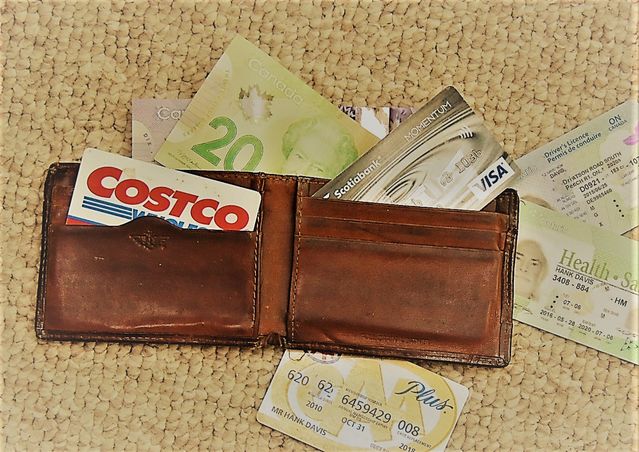Friends
It's Hard to Cope with a Lost Wallet
Is it just misplaced, or is it gone for good?
Posted September 21, 2018 Reviewed by Devon Frye

I lost my wallet. Four little words. No big deal, right? Certainly not something for Psychology Today. Right?
Wrong. On both counts, wrong. Very big deal, and very disturbing psychologically. Before I tell you about it, let me just say that this isn’t just about wallets. Nothing really changes if you substitute the word “phone” for “wallet.” In fact, maybe it gets even worse since JPGs and MP3s don’t fit in a wallet. Your music, your photos, your mail, your contact info. With the phone, all of these would also be lost. How do you get through life without your apps? Your GPS? Without having Siri to talk to?
Admittedly, my wallet doesn’t have all those features. But it did have my cash ($20, not a large amount), a blank check (just in case), my Visa credit card, and a debit card that, if used correctly, could get you into my savings account. It also had a points card from the local supermarket. It sounds bourgeois, but I really do enjoy receiving that occasional basket full of free groceries. Was that lost, also? Still, all these paled in comparison to my photo ID driver’s license. Every time I got in the car without my wallet I risked being stopped and cited for driving without a license. And, because I live in Canada, there was also my health card: my ticket to free medicine, from a blood test to brain surgery.
Over the course of the next five days, the loss of my wallet was like a nagging itch. I’d almost forget about it until a line in a movie about wallets or credit cards would drag me back to reality. I tormented myself trying to remember what I might have done with it. I struggled to reconstruct memories, but I often hit gaps. Was the wallet with me when I picked up that pizza? Did I bring the wallet into the house or did I leave it in the car? What was I wearing? Could it be in the pocket of those pants hanging over the chair? I’d awake in the wee hours of the morning having blissfully forgotten the whole thing, only to be jolted out of my calm. At 4 a.m., I was certain I’d left it in the kitchen. Unable to sleep, I’d headed downstairs and rooted through every leftover pile of food and plates I could see. I even looked in the fridge and gave the freezer a toss. All to no avail.
What if I dropped it between the car and the house? Who might have picked it up? I live in the woods, so the list of suspects included small animals like raccoons. Maybe leather represented a tasty morsel to them? I retraced my steps and phoned every destination I could remember visiting. Had anyone turned in a wallet? Nobody said yes. I kept searching the house for days. I went through my car, almost stripping it to the bare frame. I exposed carpets, looked beneath mats; I searched for items that might have gotten wedged between seats. It was all in vain.
I was becoming desperate and hope was fading. When a friend suggested that I start looking into replacing my driver’s license and health cards, I nearly took his head off. If I reported it to the government, I was throwing in the towel. I might as well stop looking. I’d be admitting that my wallet was lost. Not misplaced, but gone. Maybe even stolen. Beyond retrieval.
I had to fight that possibility every way I could. Even if it meant looking under the same pillows and reaching under the same car seats I had already checked. I refused to acknowledge the obvious: My wallet was gone. There was a huge difference in my mind. Lost was filled with resignation. Misplaced offered hope. If I just turned over enough pillows, I’d find it suddenly looking up at me. I could get on with my life.
I jokingly indulged some supernatural suggestions. You have to understand how extreme a solution this was for me, the author of Caveman Logic: The Persistence of Primitive Thinking in the Modern World. I’m the guy who gives talks on this stuff. Yet, there I was talking to some of my friends who believe in such things, asking them (jokingly, of course) if they could “manifest” my wallet somewhere in my house or car. Let it magically appear the next time I picked up a sofa cushion in the living room or searched under a car seat. I was desperate.
And then I found it. No fanfare, no fireworks. It was just under my office chair. Not quite on the floor (I would have seen that). It had gotten tangled up in the legs of the chair, so it was all but invisible to a routine search. It wasn’t until I moved the chair three feet to the left that the wallet fell to the floor. If it had descended from heaven as the answer to an unspoken prayer, the event wouldn’t have looked much different.
I froze in disbelief. The expression “I pinched myself” came to mind. I tentatively touched the wallet. It was corporeal. I looked at it. Sniffed it, even. It was real leather. I had spent five days searching, with growing desperation, for this object. And now, without so much as a "How d’ya do," it was sitting there on my carpet. A lot of hours and calories had been invested in finding this hunk of cowhide, and now that the search was over, I didn’t know whether to laugh or cry. I wouldn’t have to spend time in a government office, after all; I wouldn’t have to cancel my credit card. I could stop calling local places I had visited the day it went missing. It was here! Found! Never really lost or stolen! Just “misplaced” after all.
I called the friends I had told about it. With varying degrees of empathy, they had gone through this adventure with me. They all sounded relieved. At the least, they wouldn’t have to listen to any more rants about a lost wallet. The funny thing is, even though I’ve found the wallet, I haven’t stopped looking for it. Occasionally I walk by a corner or a pile of clothes I never checked, and I reach for it before my conscious mind can intervene. The search had become so ingrained in me—functionally autonomous is the jargon for it—that finding the wallet doesn’t seem to have shut it down.
In the modern world, much of our identity and functionality is tied to pieces of plastic. They symbolize our accomplishments and status. A wallet contains a collection of stuff that defines us and our financial power in the world. Take away your credit card, cash, and a few ID cards and turn you loose on a downtown street in a strange city, and who are you? What can you do? No access to food or lodging or clothing or toys.
Shortly after the wallet disappeared, I was visiting a friend. When I was ready to drive home, I realized I might not have enough gas for the trip. Nor did I have the cash or plastic to buy it. I borrowed the money from him with some embarrassment. I can’t remember the last time I had to borrow money. I had a glimmer of what it must feel like to be homeless. No cash, no plastic, no address, no resources. I, of course, had a home to return to and an SUV to get me there. And yet, for a brief moment, I had a taste of a world I wouldn’t want to inhabit.
I observed one final thing as I spent the week wrestling with whether the wallet was misplaced or lost. I had gone through the well-documented stages of coping with loss. Don’t get me wrong: I am not saying that losing your wallet (or phone) is equivalent to the magnitude of losing a parent, a partner, a child, or a pet. Of course, it isn’t. But as a socialized being, confronted suddenly with a measurable loss, I certainly experienced aspects of each of the five classic stages identified by Kubler-Ross in her landmark book, On Death and Dying.
The most pervasive was denial. There was never a time in the five days that I didn’t grapple with a conscious, often verbal, attempt to push the possibility of “really lost” away from me. That was not going to happen. I would not have to rearrange my life to incorporate a missing wallet.
Anger? You betcha. At whom, I’m not sure. Myself, for being careless. The universe, for being, well, the universe. Just a big impersonal system that didn’t give a rat’s a** about me and caused me to waste valuable time when I had important stuff to do.
Bargaining? Well, not quite in the classic narcissistic sense (“Please let my daughter live and I’ll quit smoking”). But I was willing to reach beyond my normal comfort zone of rationality if it would bring back my wallet.
Depression? Sad to say, but my waking mood was noticeably changed. And I did have trouble sleeping on several of those five nights. When I wasn’t in denial, that is.
Acceptance? Fortunately, I was spared this final step. My inanimate “loved one” came back to me; I found my wallet. I have vowed to scan and copy each of those cards and papers for safekeeping, and I’m going to enforce the rule about putting the wallet into the bowl on the hall table whenever I enter the house. If I forget to use the bowl and carry the wallet away with me, I will do the dishes or make a contribution to a Presidential candidate I detest.
Will this “misplacement” happen again? It seems likely. The older I get, the less mindful I become about where I put my wallet, car keys, or the TV remote. Will it happen to any of you? It likely already has and it will continue to happen. We need to see misplacement and loss as a biological given, and insert conscious steps into our routines in order to minimize the disruption in our lives.
Thanks to: Roy Forbes, Jane Getz, and Scott Parker
References
Davis, H. (2009). Caveman Logic: The Persistence of Primitive Thinking in the Modern World. New York: Prometheus Books.
Kubler-Ross, E. (1969). On Death and Dying. New York: Scribner.




